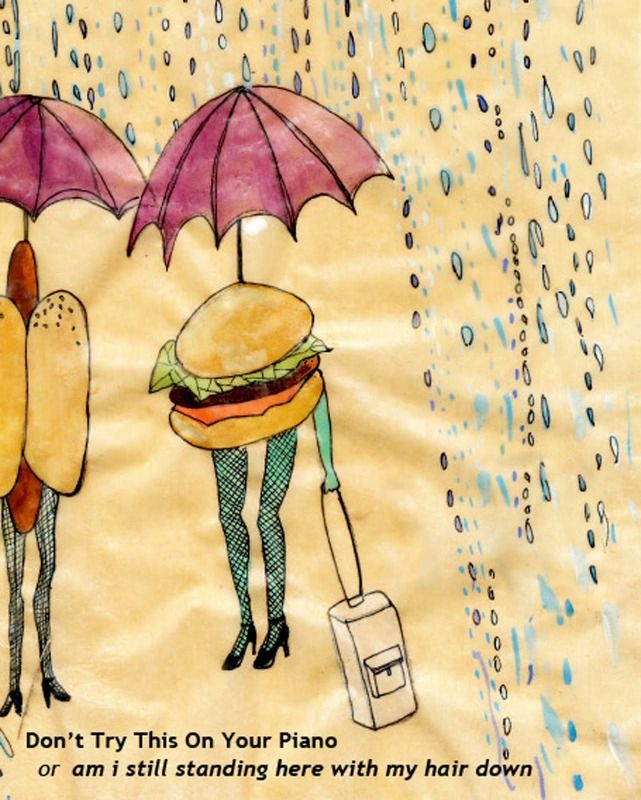As a musical and poetic technique, the
call-and-response form first appeared in the Americas during mid- to
late-seventeenth century, imported from Africa as part of the slave trade. Used in both spiritual hymns
and secular work songs, the back-and-forth interplay of voices
fostered a sense of community, promoting active participation from
all its members. In these collaborative songs, slaves lost
themselves in musical escapism and found temporary comfort in
intimate, human connection.
Over the course of several centuries,
mainstream American culture has assimilated the practice of
call-and-response into its fabric, most obviously in the form of rock
'n roll and popular music. The change of context, though, irrevocably
altered both its aesthetic and purpose. And while both poetry and contemporary
micro-presses hand-making chapbooks could hardly be called
“mainstream,” the alterations call-and-response have undergone
evidence themselves in Steven Karl and Veronica Wong's Don't Try
This On Your Piano, or am i still standing here with my hair down (Lame House Press, 2012).
The first sentence
of “I am always confusing symbolism for othering,” the
collection's opening prose poems, calls out: “Nothing else was
evident other than this scratching, and estranged you from a strange
me.” The second poem of the collection, “I am (always) confusing
(symbolism for) othering,” reponds with the line: “Nothing ever
evident other than itch.” Both the titles and the opening
sentence/line (as well as the other poems in the collection) play
with the concept of theme and variation inherent in
call-and-response. But far from developing community, these poems “erase the connection” between speakers, estranging one
from the other.
Of course, the
speakers of this collaborative chapbook don't necessarily lament the
estrangement. In fact, the prose poem “The realization of a fantasy
renders it less than fantasy” concludes with skeptical sentiments
about the process of collaboration:
But maybe the violence is not in the falling apart, but rather in the
coming together, like galaxy formation from gravitational collapse or
has that been disproven already? See also: what must be given up in
order to create.
In this instance,
the poem conceptualizes the “formation” and “coming together”
of distinctly separate entities as “violence” and expresses
anxiety about “what must be given up in order to create”
something when working in conjunction with someone else. For, indeed,
those who engage in collaborative writing must concede individual
aesthetics, content, and form for the sake of communal writing. Does
one view collaboration affirmatively through the lens of community
formation, or negatively through the lens of violence toward an
individual subjectivity?
While
Don't Try This appears
to champion an autonomous sense of self, the chapbook occasionally
questions both the efficacy and possibility of a hermetic
subjectivity. In “violence is / any year / in which,” the
speakers write: “tomorrow we will burst out of our skin and decide
whether metamorphosis is self-destructive”; and earlier in “My
Life Has Been Breaking One Egg With Another,” we're told: “Perhaps
I do not believe in freedom.” The first passage leaves open the
possibility for an affirmative view of collaboration when we “burst
out of our skin” and enter the communal realm, while the second
passage debates whether or not the concept of “freedom,” or the
individual, is even possible.
Certainly, the
speakers of Karl and Wong's collection exist in a self-described
world of separation and distance where connection is unwanted or
out-of-reach; or, in their own words:
Thank you for asking for a photo of me. I have been thinking a lot
about what to send you—it seems unfair because in reality, while
I've taken quite a few pictures that I'm pretty sure you would like,
I want to be sending them to someone else. I've been imagining what
it's like to sleep next to you because I've been remembering sleeping
next to him, how it was like separation, and distancing. How solitude
is like white hydrangeas How I only know his summer wardrobe. I feel
sad after I dream your hands pressing against me.
The “separation,
and distancing” of two people, coupled with the analogical
comparison of “solitude” with the natural beauty of “white
hydrangeas,” certainly challenges positive paradigms of
collaborative poetry. But, in the end, “the filling up or the
emptying out” of one's writing with a collaborator is a question
that the collection leaves unresolved.


No comments:
Post a Comment